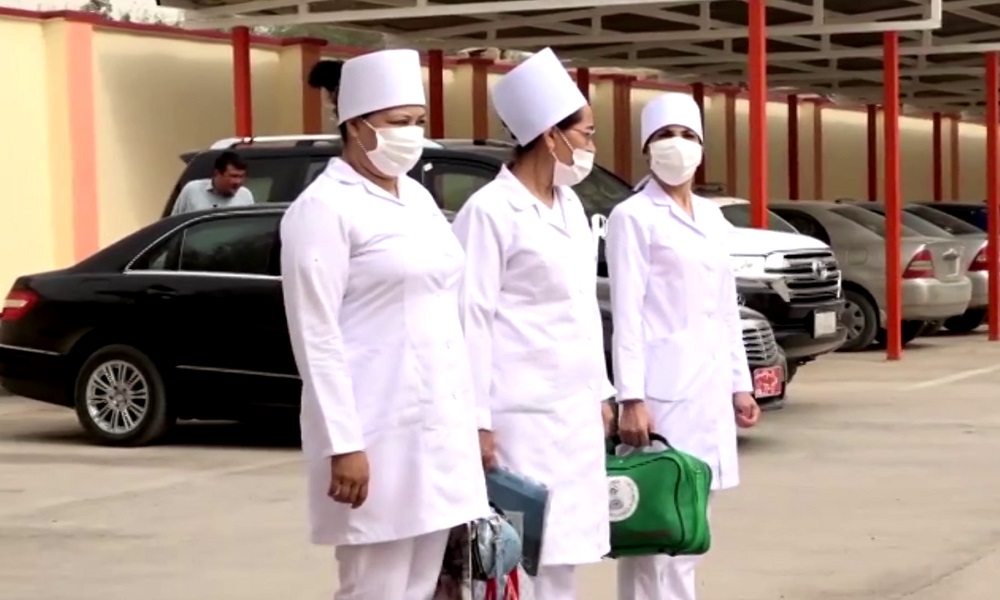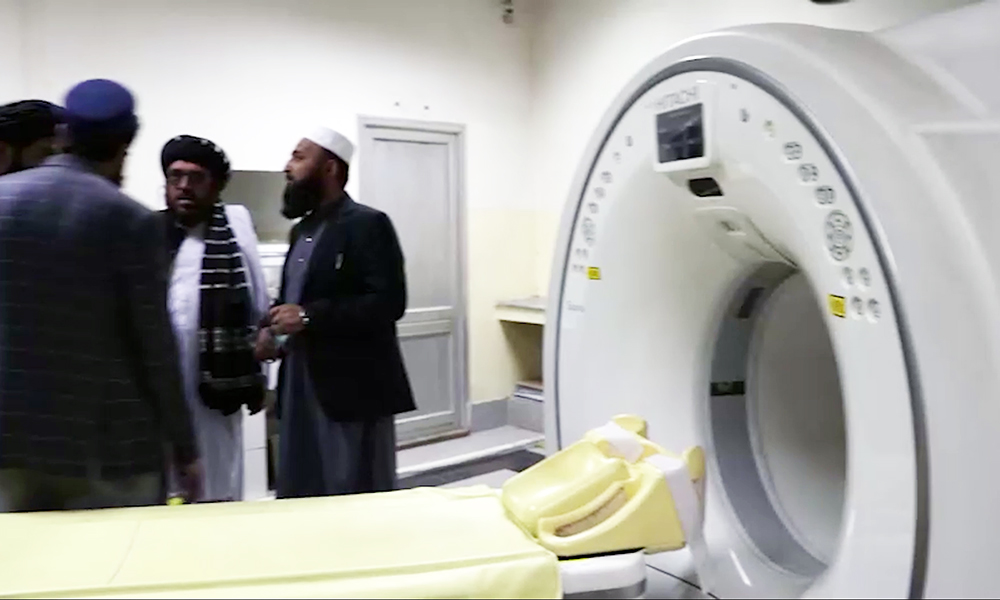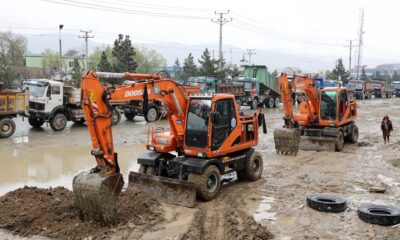Health
Turkmen doctors provide medical aid to 473 pregnant women in Herat in last 9 days

Turkmen female doctors have provided health services to more than 700 patients in Afghanistan’s Herat province in less than two weeks, health officials said, adding that they arrived nine days ago in the province.
These doctors have treated 473 pregnant women and provided health services to 276 children in the health center of Torghundi town in past nine days, among them 12 children were also born, according to officials.
Turkmenistan has built a 20-bed maternity hospital in Torghundi town, which provides all facilities, health services and medicine in a sustainable way.
Officials of the Consulate of Turkmenistan in Herat meanwhile said that this health center currently provides health services to the people of four districts.
“Today, we are very pleased that this clinic is not only for the people of Torghundi town, but also provides health services for the people of neighboring districts and villages such as Kushki Kuhna, Gulran and the center of Kushk district, Rabat Sangi and areas close to Torghundi,” said Turkmen Counsel General Quch Muradov for Herat.
The building of this health center in Torghundi town was built with humanitarian aid from Turkmenistan, but the specialist doctors of this country sometimes come in order to advise Afghan doctors and provide health services to this health center. Earlier, the government of Turkmenistan donated a package of needed medicines to the center.
“Patients from four districts are treated here, after this building was built and the facilities were provided, the deaths child and maternal mortality have been prevented,” said Mawlavi Mohammad Nabi, head of health council of Torghundi town.
Turkmenistan built this health center for the treatment of female patients nine years ago, but recently it has restored all its departments. The residents of Herat say the humanitarian assistance of the Turkmen government has been effective for the Afghans.
“Based on the request of the authorities, the building of this health center once again has been completely restored, and spices and medical supplies have been sent to this center recently, and its doors and windows, which were destroyed, have also been repaired,” said Amanullah Haqyar, head of Turkmen Islamic Solidarity Council for Western Zone.
Torghundi town is more than 100 kilometers away from the center of Herat city, this health center has been able to solve the health problems of the people of Kushk Rabat Sangi district and its neighboring districts to some extent.
Health
Azerbaijan urged to help improve capacity of Afghan health workers

Acting Minister of Public Health Qalandar Ebad, in a meeting with Azerbaijan’s ambassador, Ilham Mohammadov, called for the country’s assistance in improving the capacity of Afghanistan’s health workers.
The two sides also discussed cooperation in the health sector, capacity building of Afghan health workers, and Azerbaijan’s role in the health sector and other issues, according to a statement released by the Public Health Ministry.
Azerbaijan’s envoy said that his country seeks to cooperate with Afghanistan in a sustainable manner in the field of health.
In other news, the foundation stone for the construction of oxygen production facility was laid at the Indira Gandhi children hospital in Kabul.
Officials of the Ministry of Public Health said that the facility will be built with the financial and technical assistance of the World Health Organization, and with the capacity to produce 200 cylinders of oxygen daily to meet not only the needs of the hospital, but also other health facilities.
Health
Balkh health officials report sharp increase in number of cancer patients

Balkh Public Health Department officials say there has been a significant increase in the number of patients with cancer in the province.
“In 1401, about 2,613 OPD (out patient department) cases were registered with us. In 1402, these figures were 4,912 cases,” said Ehsanullah Kaliwal, the head of the oncology department at Balkh Regional Hospital.
Some doctors say genetic factors, environmental pollution, arbitrary use of medicines, and excessive consumption of meat were reasons for the sharp increase.
One doctor said cancer was also hereditry.
However, a large percentage of cancer patients in Balkh have stomach cancer. Many of them have appealed for the government to improve treatment facilities.
According to health officials, in the first month of this solar year (April), 423 cancer patients visited this hospital for treatment.
Health
Majority of Afghans with mental disorders are women: officials

Based on last year’s data, 52 percent of people with mental disorders in Afghanistan are women, the Ministry of Public Health said.
However, after the Islamic Emirate took over the country and with the improvement of nationwide security and the provision of better health services, mental disorders have decreased, the ministry said.
“Overall, the mental security of men and women in Afghanistan is not ensured and their mental security is disturbed. According to the figures shared with us, in 2023, 52 percent of the visitors for mental disorders were women,” said Sharaft Zaman Amarkhil, the spokesperson of the Ministry of Public Health.
“Generally speaking, we can say that compared to the past, the instances of mental illnesses have decreased,” he added.
People suffering mental disorders mostly refuse to share their problem, willingly or unwillingly.
“There are many problems at home; We are poor. I finished school, but didn’t find any job,” Ansar, a mentally ill person, said.
According to the World Health Organization (WHO), half of Afghanistan’s population suffers from mental distress.
Factors such as unemployment, poverty, domestic violence, ban on girls’ and women’s education and work, and drugs are said to be key contributors to mental distress.
-

 Latest News4 days ago
Latest News4 days agoRashid Khan named AWCC’s brand ambassador
-

 World4 days ago
World4 days agoMalaysian navy helicopters collide in mid-air, 10 killed
-

 Sport4 days ago
Sport4 days agoJaiswal ton powers Rajasthan to big IPL win
-

 World4 days ago
World4 days agoNorth Korea officials visit Iran in a rare public trip
-

 Latest News5 days ago
Latest News5 days agoAt least 1,500 families affected by recent floods: IRW
-

 Sport4 days ago
Sport4 days agoMawj Sahil player scores stunning halfway line goal in 1-0 win over Jawanan Wahedi
-

 Sport3 days ago
Sport3 days ago‘Serious talent’ Fraser-McGurk bonds with Warner to light up IPL
-

 Latest News4 days ago
Latest News4 days agoUS report cites ‘significant deterioration’ in Afghan women’s rights last year
























